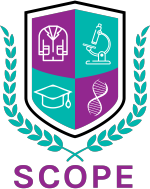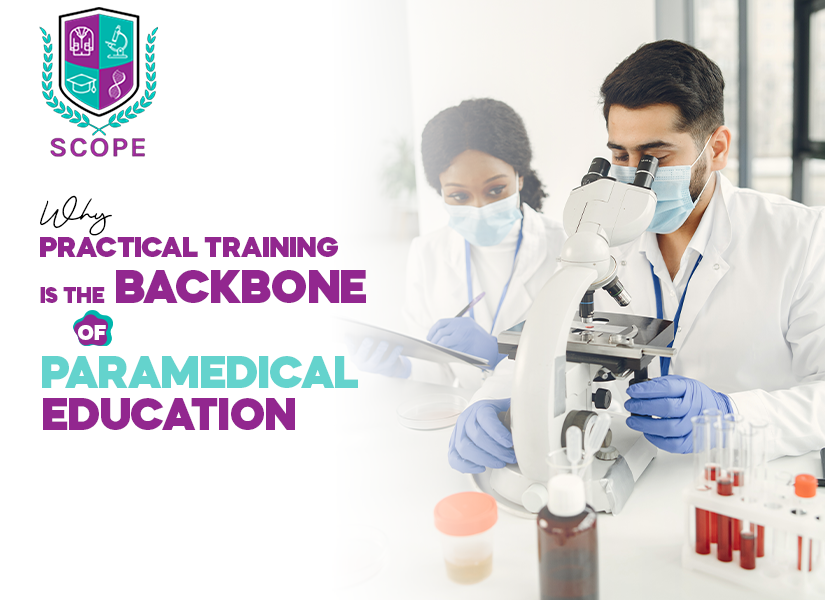Do you know what’s the most integral element of paramedical education? It’s practical training. In fact, it’s the foundation of all paramedical courses. It’s the hands-on experience that shapes competent and confident professionals. Integration of real-world exposure in fields like medical lab technology, radiology, dialysis, and nursing is no longer an option; it’s an evident essentiality.
To define paramedical practical training in simple terms: it is the structured hands-on learning for paramedic trainees in performing diagnostic tests, operating medical and lab equipment, conducting patient care tasks, following safety and hygiene protocols, and working alongside doctors, nurses, and lab professionals in labs, hospitals, diagnostic centers, and simulation settings. But why is this important? Why is practical training indispensable for paramedical students? Let’s understand it bit by bit.
Why Practical Training in Paramedical Courses is Crucial
- Real-time Application: It’s the instant application that matters. Studies show you retain 75% by doing what you studied. Similarly, when students apply what they learned in real or simulated scenarios, they tend to be better paramedical professionals than those who don’t practice hands-on.
- Skill Development: The simple definition of skill highlights the ability to do something well, mainly because of training, practice, etc. Operating tools, drawing samples, preparing reports, or assisting in patient care—these are learned by doing paramedic practical training.
- Workplace Readiness: There’s no point in learning all the theoretical theses if you can’t expect to work in a job after that. Practical training aims to create candidates who are preferred by hospitals and labs and who can start contributing from day one.
- Critical Training: You’ll not understand the adrenaline rush unless you experience the hectic healthcare workspaces. Practical training ensures you have a hold on managing emergencies, making decisions on the spot, or interpreting lab results.
- Confidence Boost: Your confidence might falter if you are directly exposed to real-world scenarios as soon as you graduate from the course. Periodical exposure to real-life conditions with practical training builds accuracy and self-assurance.
Lab Technician Practical Skills Students Must Learn
As a DMLT or MLT aspirant, here are essential skills that you should master:
- Blood and urine sample collection
- Slide preparation and microscopy
- Hematology and biochemistry analysis
- Use of lab equipment like centrifuge, colorimeter, and autoclave
- Waste disposal, infection control, and lab safety protocols
- Digital record-keeping and test reporting
These skills make sure that you are ready with skills that form the day-to-day responsibilities of the profession.
DMLT Practical Training: What to Expect
You might think, “But what do these practical training curriculums consist of?” That’s a fair doubt, and here’s what it generally includes:
- Weekly lab sessions under faculty supervision
- Assignments that involve test analysis and sample handling
- Internships in pathology labs or hospitals
- Exposure to real patient cases under guidance
- Practical exams based on diagnostic accuracy and lab management
The combination of the above training methods prepares those who can be referred to as perfect paramedic professionals.
Benefits of Paramedical Hands-On Experience
- Increased employability: Students who know how things work in actual scenarios are more likely to get hired.
- Higher salaries: Since you already know how things work, the employer’s training investment in you is less, resulting in higher salary budgets.
- Career clarity: Once you know how you would have to spend your time on a job, you can be more clear about your career options—if you want to do something or not.
- Professionalism: Exposure to hospital routines builds employer-demanded soft skills like teamwork, punctuality, and ethics.
Healthcare Employers Value Practical Skills
Employers value these practical skills you build with the help of practical training because they can expect:
- Immediate productivity
- Minimal on-job training
- Technical confidence
- Familiarity with tools and processes
Practical training is the bridge between being a student and becoming a professional.
Conclusion
No doubt, knowledge is excellent. But knowledge unapplied is useless. Because why did you learn it in the first place? Practical training prepares you to face real-world challenges with confidence and competence. It’s not just a USP thing that colleges show on their websites; it’s an absolute requirement of the healthcare industry. If you want to build a successful career in healthcare, consider an institute like SCOPE, where paramedical hands-on experience is woven into the curriculum.

